Women in Temple History

In honor of Women's History Month, we're republishing an article from our archives.
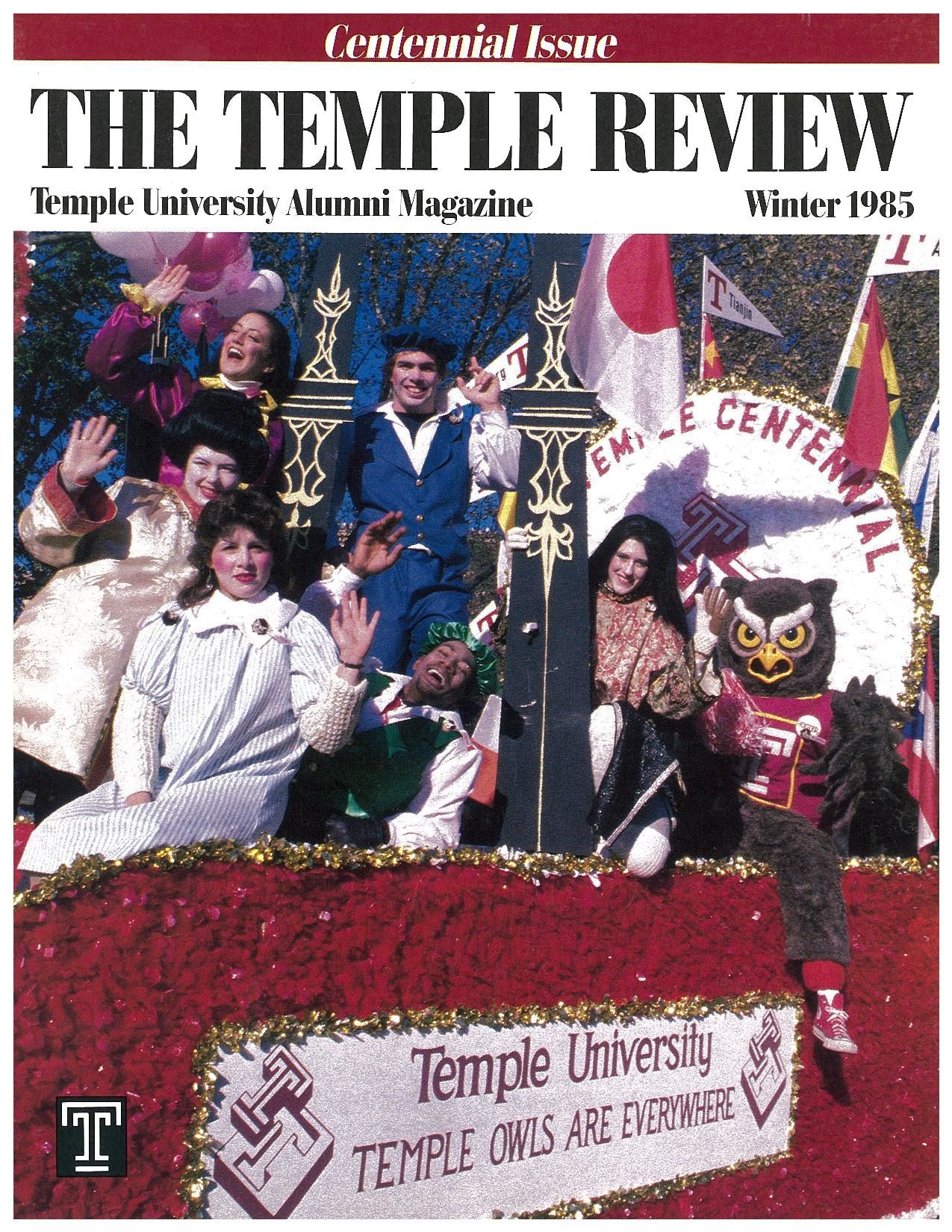
This story originally appeared in the centennial issue of The Temple Review in Winter 1985
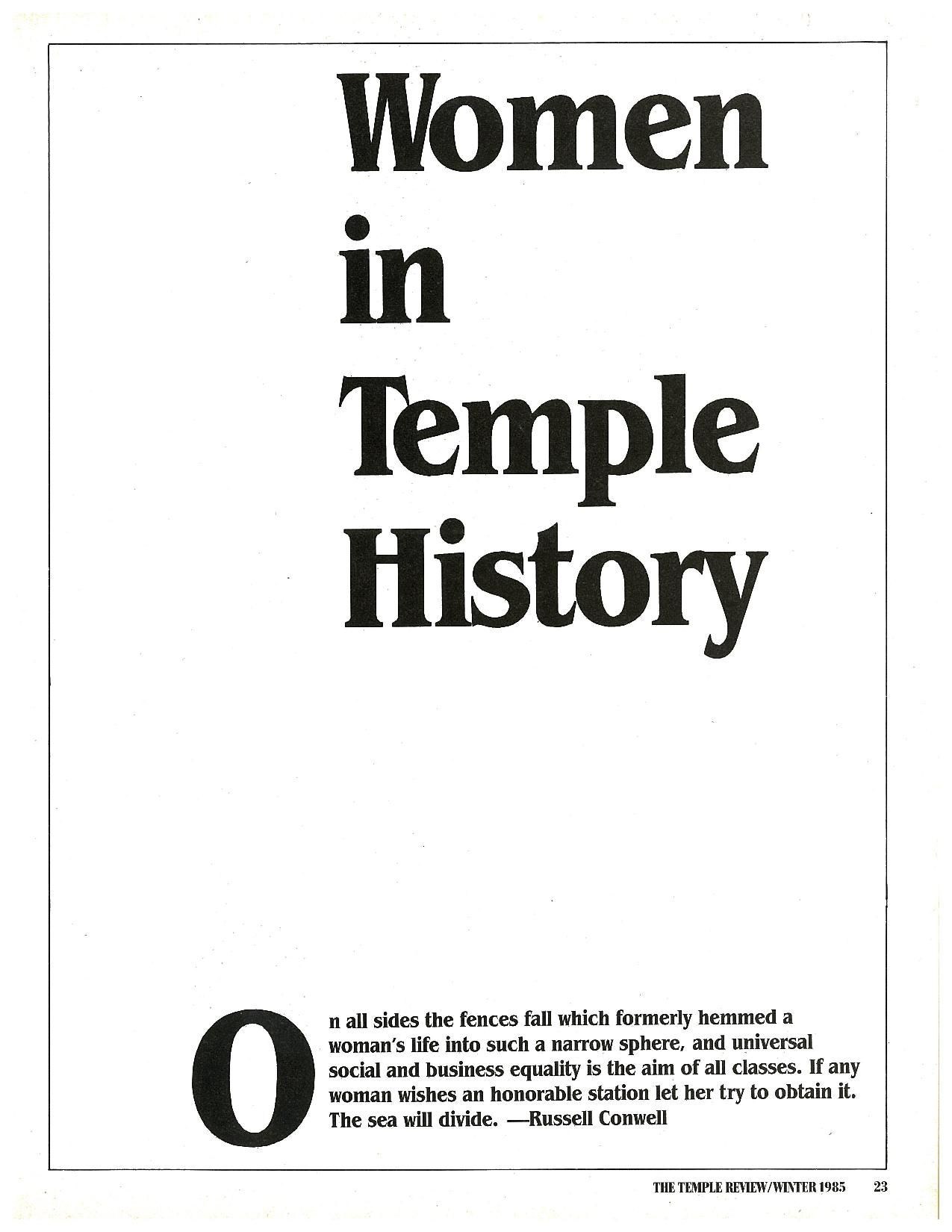
On all sides the fences fall which formerly hemmed a woman’s life into such a narrow sphere, and universal social and business equality is the aim of all classes. If any woman wishes an honorable station let her try to obtain it. The sea will divide.
Laura Carnell Dean of Deans
At the corner of Broad and Montgomery stands an imposing gothic structure, Conwell Hall and Carnell Hall. It is altogether appropriate that these buildings are attached, representing as they do the interconnected legacies of Russell Conwell, the minister with a vision of higher education for the masses, and Laura Carnell, his teacher-administrator who made that dream a reality.
The diminutive teenaged Laura Carnell was one of Conwell’s parishioners who was mesmerized by his words. Born into relative affluence, she became a school teacher and devoted disciple of the Reverend Conwell. In 1893, at the age of twenty-six, she received the call to join forces with Dr. Conwell and become principal of the Women’s Department of a struggling Temple College. The fact that there was no Women’s Department did not deter Miss Carnell, and she set out to solve that problem. Not only did she establish a college for women, but in the next few years she also laid the groundwork for a law school, medical school, schools of nursing, education, commerce, liberal arts, fine arts,—creating from the humblest of beginnings a major university.
The formation of the law school was characteristic of the informal and creative way this brisk, energetic, gracious Dean of Deans went about her business. One evening a young man came to her begging for a class in law. She agreed to provide one if he could find eleven more students. He did, and a law school had its start.
An empty room was considered a sin. The medical school began in lecture rooms unoccupied from 5 to 7 P.M. Taught by a volunteer faculty, it achieved recognition as one of the top ten schools nationally by 1925. That same year Temple could boast of a university of 11,000 students, a far cry from the 200 people from widely varying backgrounds and abilities who comprised the student body thirty years earlier.
At the opening of each semester Dr. Carnell was at the college every evening to greet students. She still found time to receive a Bachelor of Arts degree from Temple in 1898, teach art history classes for twenty years, serve as acting dean from 1897 to 1905, act as dean of the University from 1905 to 1925, become Associate President from 1925 to 1929, and to serve on the Philadelphia Board of Education. In recognition of her unique contribution to the fledgling college, Temple awarded her an honorary LLD in 1902.
Dr. Carnell was active in many civic and philanthropic organizations, but most of her time—as many as sixteen hours a day—was spent at Temple. She was fond of saying, “There is no real difference between work and play,” and she lived up to her high standards. She gave attention to every detail—arranging curriculum, organizing classes, establishing educational standards, selecting textbooks, approving faculty appointments, negotiating teachers’ salaries, and handling finances. When the mundane administrative affairs were completed, Dean Carnell stamped and sealed the mail, her toes barely touching the floor as she sat at her roll-top desk.
It is tempting to assess Laura Carnell’s career from a feminist viewpoint, but in reality she was not an open supporter of the women’s suffrage movement which gained momentum in her lifetime. While she urged young women to seek education, she asked married women to become involved with women’s clubs and “go back to the home with fresh interests and courage.” Combining career and marriage was unthinkable. Once, in an unguarded moment, she confided to her protégé Milton Stauffer that she had made a great sacrifice when she gave up the opportunity to marry a man she deeply loved.
In the thirty years they worked together, Dr. Stauffer observed Laura Carnell treading carefully with a male faculty and administration in an era when there was opposition to women’s holding office, speaking in public, and even attending college. After Russell Conwell’s death, Dr. Carnell was offered the Presidency, but she declined because it was “a man’s job.” She was named Associate President and continued directing the school’s affairs until her untimely death.
The modern twelve-story building adjoining Conwell Hall was dedicated to Laura Carnell in 1930, a year after her unexpected death due to complications following surgery. In the year of Temple University’s Centennial, it is time to stop and remember the often unheralded power who directed the progress of the college, who knew every student’s name, who was involved in every facet of development and operation: Laura Carnell.
—Renee Margulies
Special thanks to Mrs. Miriam Crawford, Director of the Conwellana-Templana Collection, Samuel Paley Library, Temple University
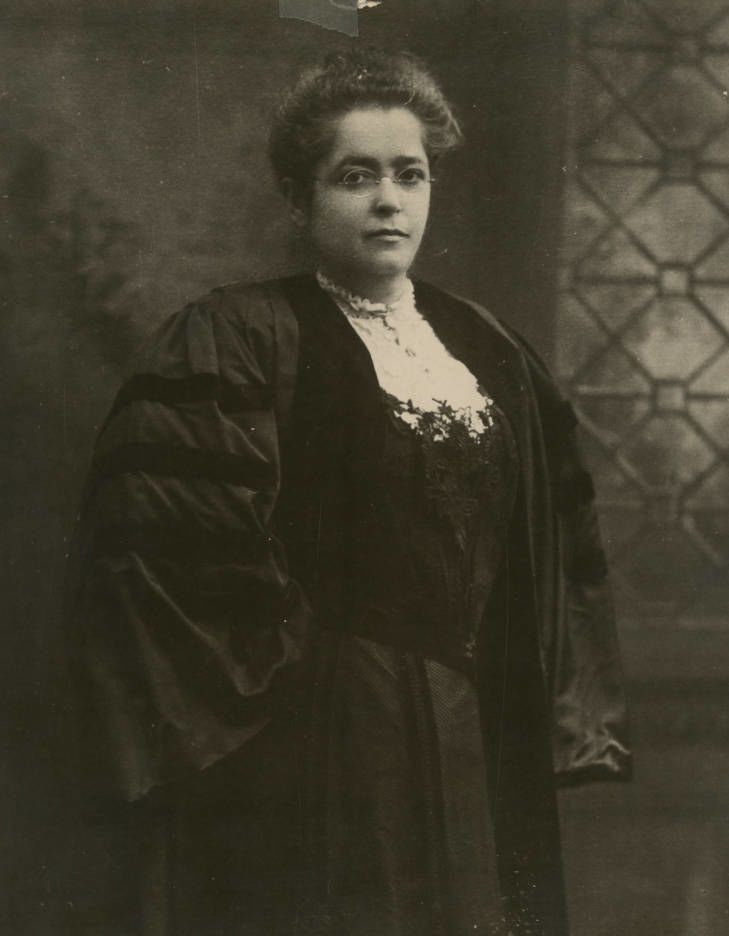
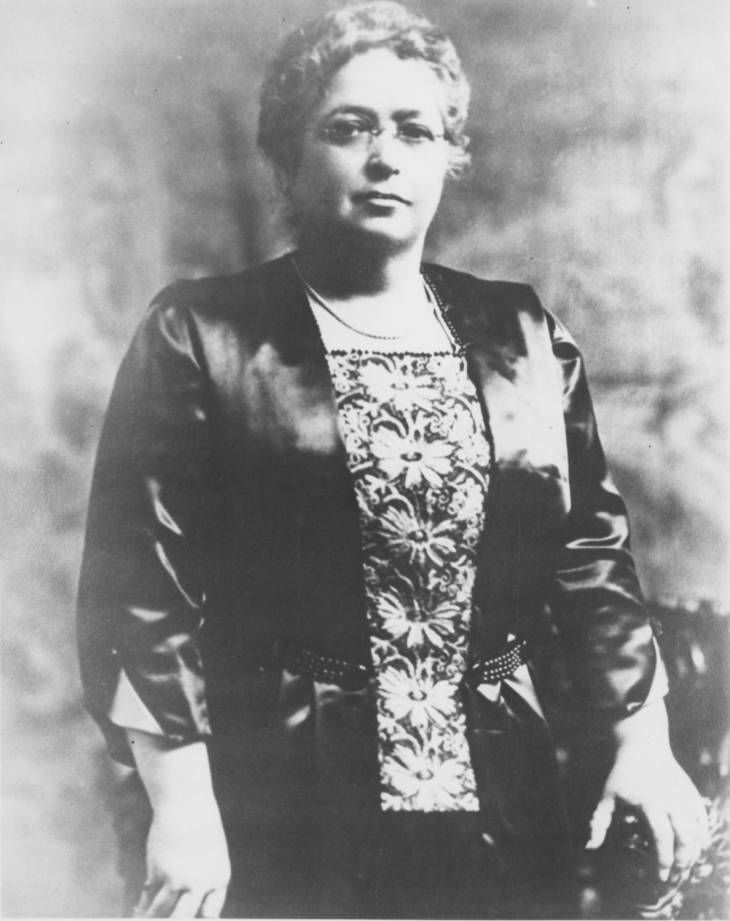
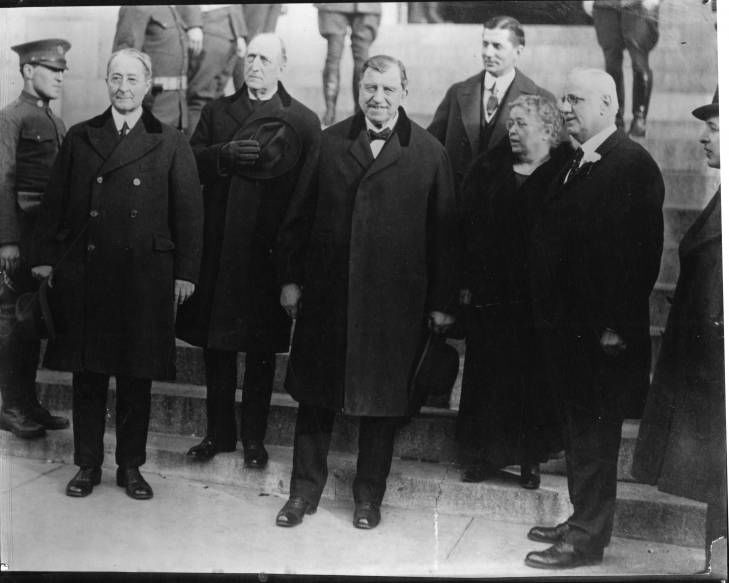
Laura Carnell with Dr. Russell Conwell and others at the dedication of Conwell Hall in 1924
Laura Carnell with Dr. Russell Conwell and others at the dedication of Conwell Hall in 1924
The notion that woman should be shut out of direct competition with men is born of both selfishness and of unselfish chivalry, and she has to contend with her best friends and her worst enemies in a strange alliance in order to secure her rightful place. But she will get it.
Provost Brownstein Focus on Excellence
Dr. Barbara Brownstein was selected by President Liacouras to serve as Provost, the University’s highest academic officer. She is one of only a few women in the entire country who hold such a high position. And her selection provides an interesting parallel to that of Laura Carnell, the administrator who, one hundred years ago, directed the academic life of the then-fledgling University for Dr. Russell Conwell.
An internationally recognized molecular geneticist, Dr. Brownstein’s background includes four years as chair of Temple University’s biology department, a year as visiting scientist in London at the Imperial Cancer Research Fund Laboratories, and two years in Sweden, representing the U.S. Public Health Service.
Perhaps Dr. Brownstein’s most challenging assignment to date has been her year-long review of all departments of the University, culminating in the designation of Centers of Excellence, recipients of the recently established Funds of Excellence.
“We discovered many exciting projects were going on at Temple,” said Dr. Brownstein. “The variation in scope was very impressive—everything from a $10,000 grant to a single professor for publishing monographs on North African French literature, to a material science project which involves six senior scholars and up to a $1 million budget.
“Each project was excellent and was appropriate to its own area, but they were very different in concept, execution and scope.”
The review process brought together groups of people who had common interests but who did not know each other. As a result of the committee meetings, there has been cross-fertilization, and disparate disciplines are beginning to work together.
“Temple has some extraordinary scholars,” continued the Provost. “In some cases, a small amount of seed money has allowed them to revive or to expand some very exciting projects.”
Among the most dynamic projects are the Writer-in-Residence in the graduate Creative Writing Program, which brought Robert Creeley, nationally prominent poet, to campus in November. Donald Barthelme and Susan Sontag are two other luminaries slated for week-long visits to give workshops and seminars.
“A relatively small investment has generated enormous excitement within the department, on campus, and in the broader educational community,” commented Dr. Brownstein.
Other distinguished visiting scholars include a German philosopher, a mathematician and several young medical researchers.
The Provost misses teaching, despite the quick pace of administration. “I expect to teach a course in the fall semester,” she said. “It’s a course I’ve given before: ‘Human Growth, Reproduction and Development.’ It is an evening course sponsored by the Biology Department and the Women’s Studies Program.”
The satisfaction of her findings after the year-long review process, however, makes up for her not being able to partake of the scholarly life right now.
“Our excellence in many fields has not always been recognized, internationally or externally,” she observed. “The review process has allowed us to make public the wide range of scholarship that exists at Temple. It was most interesting for me to find exciting projects not just by senior scholars, but also by young scholars who have just recently begun their careers.
“And the Centers for Excellence cover just about every discipline, showing we have strength in many areas or research and scholarship.”
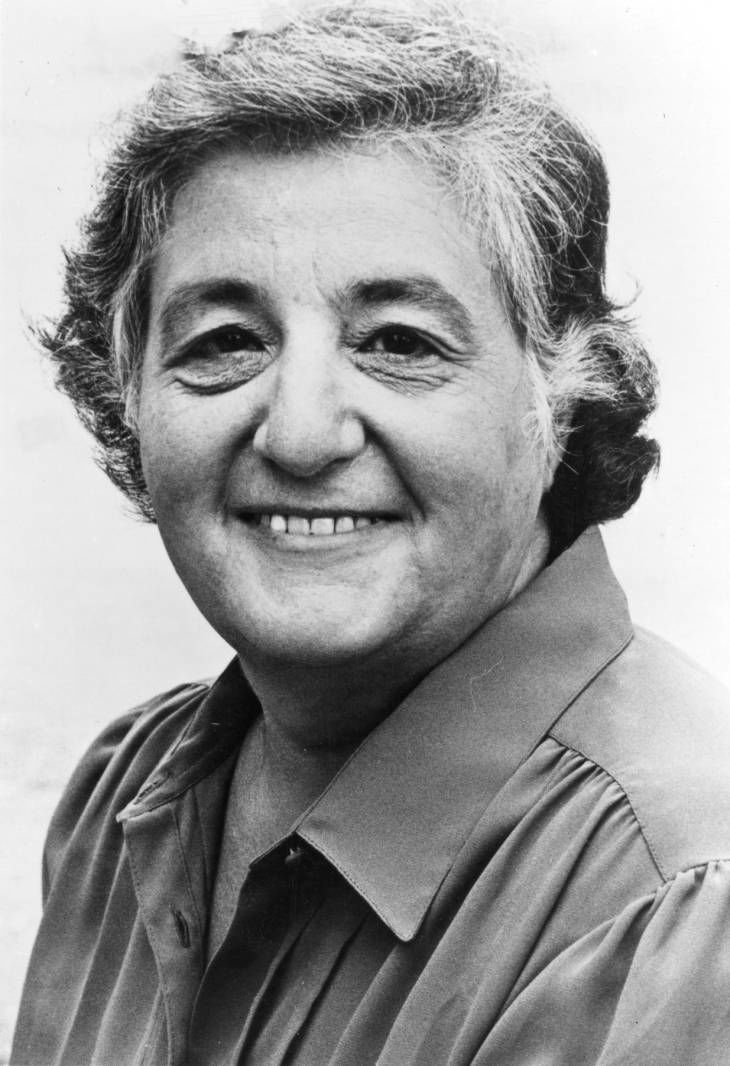
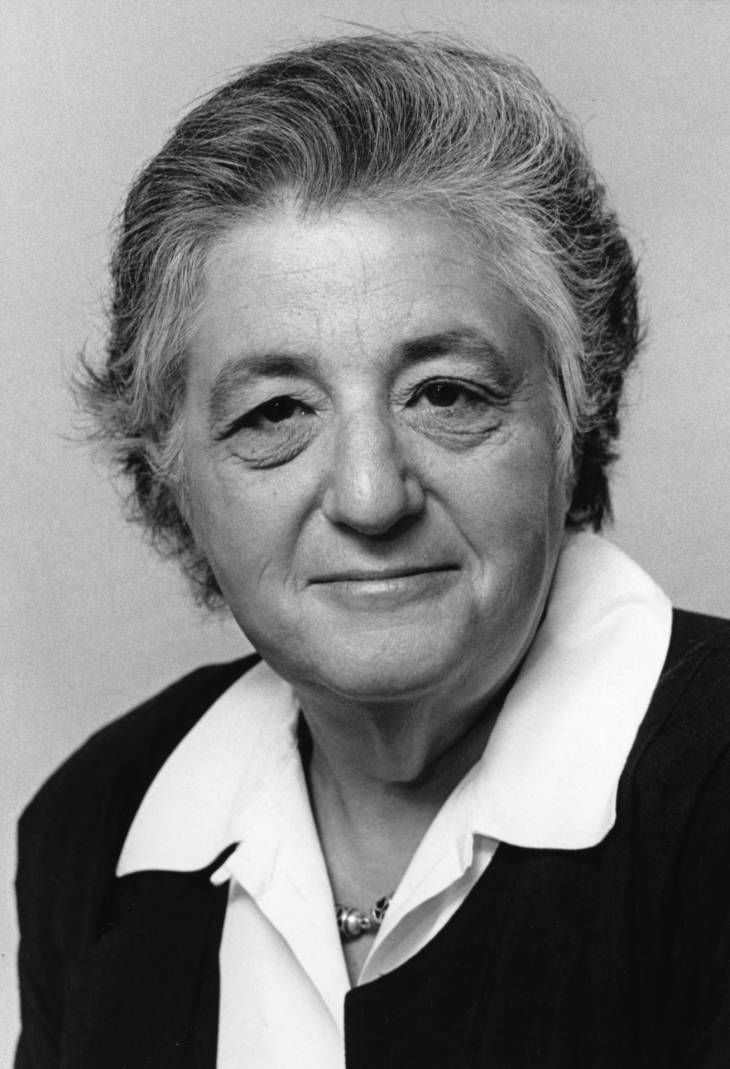
Men will mainly be what women make them, and there can never be entirely free men until there are entirely free women with no special privileges, but with all her rights.
Helen Hodgens, M.D. A Life of Service
Dr. Helen Williams Hodgens must be the kind of woman Russell Conwell had in mind as a model for her sex. A 1918 graduate of what was then Temple’s College of Liberal Arts and Sciences, Helen bowed—at first—to the wishes of her family and became a teacher for three years after graduation.
“At that time, women didn’t go into medicine,” she reminisced on the phone recently. “My uncle was a physician, and he steered me into teaching for a few years in order for me to mature before entering medical school.”
So Helen taught Latin, geometry and physics near Allentown during World War I. There was no girls’ basketball team at the high school where she taught, so Helen created a team.
“We played—and won—our first game in 1920,” she recalled. “So after that, whenever the boys were bused to a game, the girls’ team went and played afterwards.”
Helen was the only woman teacher in that school, but she handled the assignment well. It prepared her, in fact, for her last two years of medical school at Temple University, where she and three other female classmates constituted the sole women in the program. (All four had transferred to Temple Medical School after two years at Women’s Medical College.)
She interned at Philadelphia General Hospital, becoming chief resident and serving as physician to the personnel there and at the Contagious Diseases Hospital.
After that, Helen, who was then Dr. Williams, ran a sanitarium in Chestnut Hill for mental patients. For three years she was medical director of Women’s Hospital. When it merged with a hospital in West Philadelphia, she became a clinical pathologist at Allentown State Hospital in 1981.
Five years at the Allentown institution taught her a great deal about the budding science of psychiatry. She also married while in Allentown, becoming Dr. Hodgens in the process. She and her husband returned to Philadelphia where Helen became senior physician and psychiatrist at Friends Hospital for over thirty years.
She also continued her affiliation with Women’s Medical College, not retiring until she was 70 years old. But retirement did not mean indolence. Helen did volunteer work at Bridgeton Hospital near her New Jersey home for many years, along with helping out at the Retired Senior Volunteer Program. Until three years ago, Helen waited on other senior citizens who came to the center for a hot meal.
Now that Helen is 87 and has some health problems, she allows others to wait on her. Although she gave up driving ten years ago because of her arthritis, she still maintains her license—just in case.
In 1975, Dr. Helen Williams Hodgens attended her 50th reunion as part of Founder’s Dinner at the Bellevue Stratford that year.
“I was the only woman from my class present,” she said. “I was presented on stage. Some of the boys were there, though, and they all looked the same.”
She still has contact with a friend from her medical school days, Helen Hayes Ryan. And her memories of her undergraduate time at Temple have not dimmed by the passing of decades.
“When I was in liberal arts, I knew Dr. Russell Conwell. We used to have parties at College Hall. He always came to them and was very friendly and talkative.”
She remembers that most of Dr. Conwell’s teeth were capped in gold. And she once had the privilege of attending his famous “Acres of Diamonds” lecture in Baptist Temple. “He really held everyone’s attention,” she recalled.
When asked about the extent of campus life in her time at Temple, Helen laughed. “Our campus didn’t amount to anything in those days. There was one big building next to the church.”
Helen has the highest praise for Laura Carnell, who was, as she said, Dr. Conwell’s “right-hand-man”, so to speak. “She ran the Liberal Arts College. He really left everything to her in that department.”
Dr. Helen Williams Hodgens would have talked to us longer—but her friends at the RSVP program were waiting for her, and it was time to go.
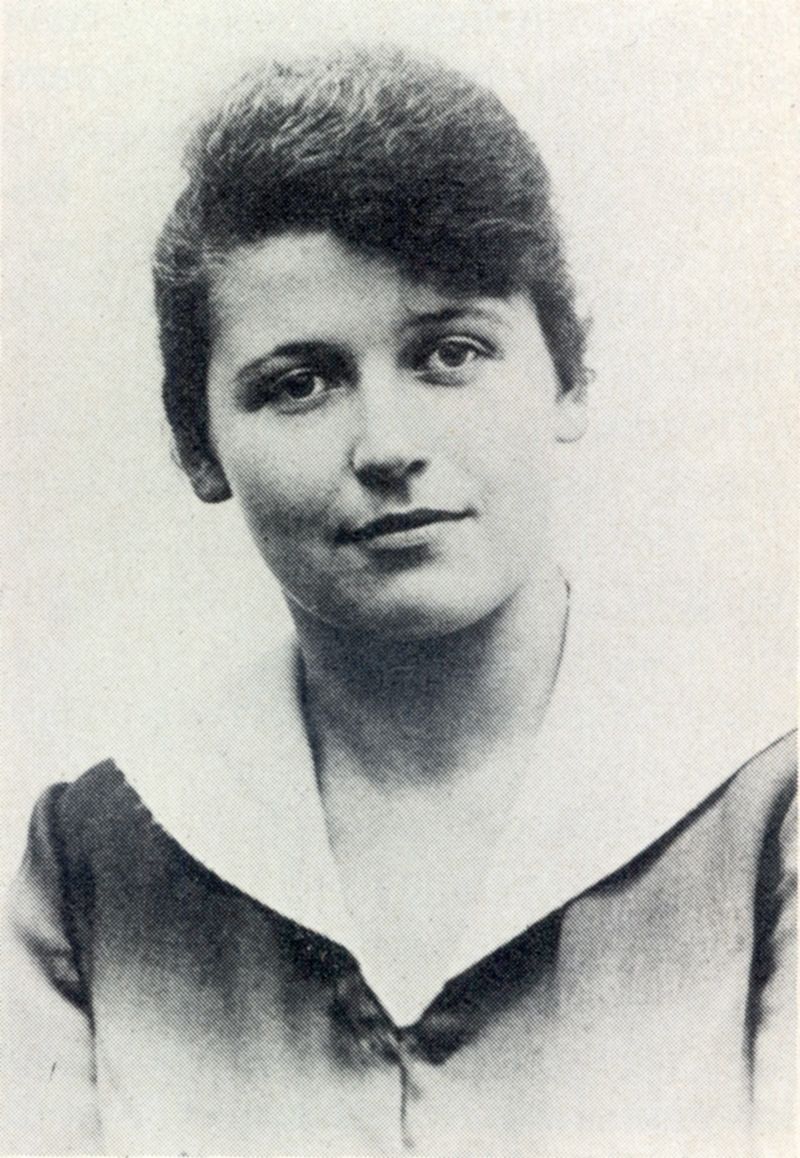
Mother Wonderful Writes Again
Myra Chanin, BA CAS ʼ59, may not have spent much time in class when she was an undergraduate at Temple, but she credits her college days with her success now as author and television personality.
“What I got out of Temple was a real education—I was extremely well read, and I was surrounded by terrifically smart students.”
Myra credits her creative writing teacher at Temple for inspiring her in her literary endeavors. That discipline, plus a natural wit and a penchant for baking, have been translated into three books: The Secret Life of Mother Wonderful (satiric essays on life in the married lane); Mother Wonderful’s Cheesecakes and Other Goodies, and her latest effort, Mother Wonderful’s Chicken Soup, by 101 Productions, a loving, if irreverent, look at Myra’s mother’s very traditional method of creating “Jewish penicillin”.
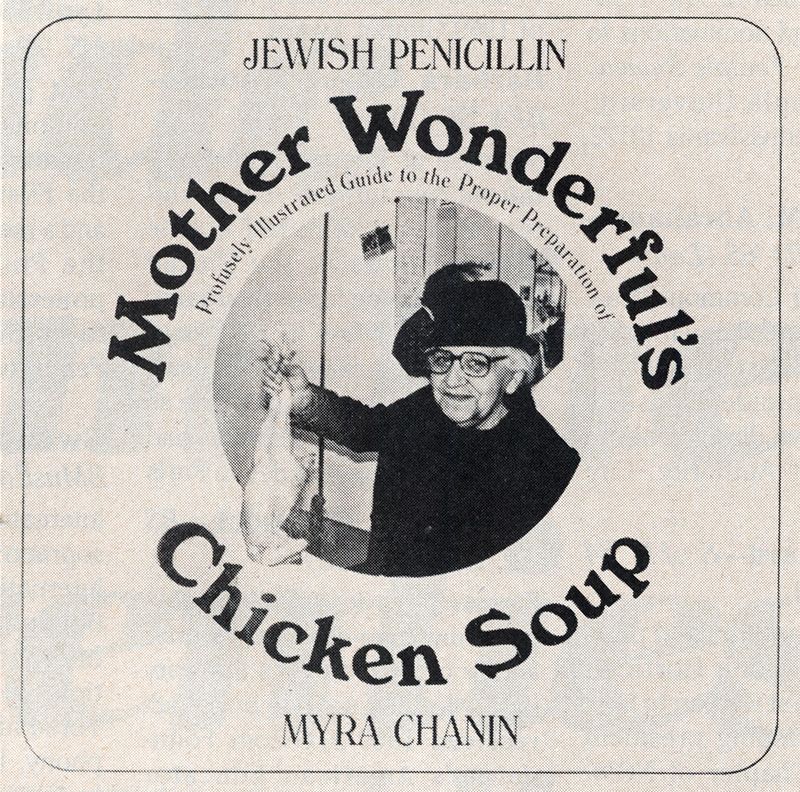
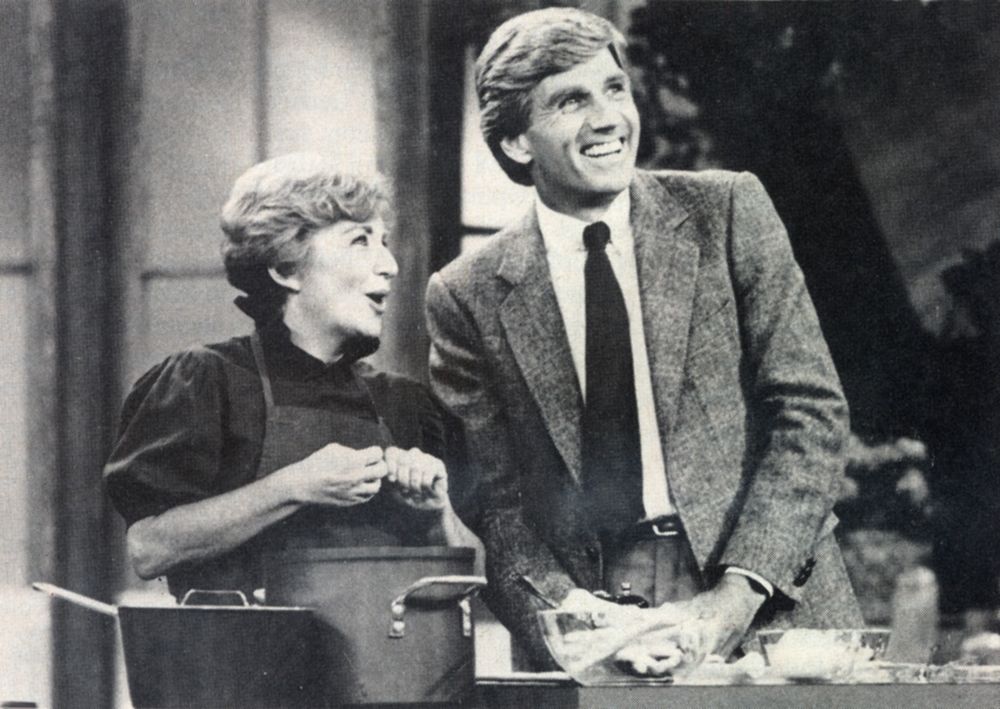
Myra Chanin does her “Mother Wonderful” segment with “Hour Magazine” host Gary Collins on national TV.
Myra Chanin does her “Mother Wonderful” segment with “Hour Magazine” host Gary Collins on national TV.
Diane (Schatz) Klein, BA CAS ʼ64, and Marsha (Neimand) Dorman, BA CAS ʼ66, MSA ʼ81, are co-authors of the book How To Stay Two When Baby Makes Three. The book, published last spring by Prometheus Books, offers couples effective strategies and practical advice on how to remain lovers once they become parents.
The pair explains that it can be crucial that new parents recognize that they will have to rebuild and renew their relationship once there is an additional family member. The reality of a new baby demanding immediate and constant attention can be devastating to the relationship of a couple not prepared for the pressures of caring for a new baby and the concurrent change in lifestyle.
Roll Call of Honor: Temple Women
The following women represent a sampling of the outstanding alumnae whom Temple University is proud to claim as its own. We would appreciate your nominees to be added to this list in subsequent issues of The Temple Review. Send nominations to the editor, The Temple Review, 602 USB, Temple University, Philadelphia, Pennsylvania 19122.
Hon. Lynne M. Abraham—BA ʼ62 (AS), JD ʼ65 (Law)
Judge, Court of Common Pleas, City of Philadelphia; former Philadelphia assistant district attorney, Homicide Division; former executive director of the Redevelopment Authority, city of Philadelphia
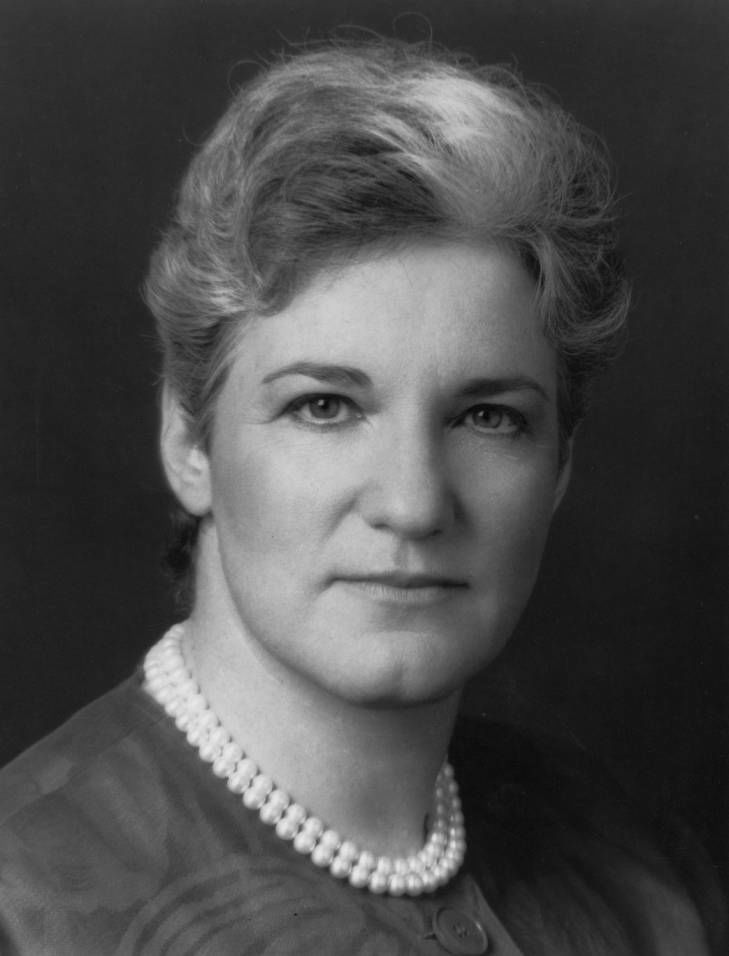
Hon. Lynne M. Abraham
Hon. Lynne M. Abraham
Ernesta Ballard—S of H ʼ84 (Horticulture)
Horticulturist; author; past president, Pennsylvania Horticultural Society (first woman to hold that post); founding president Philadelphia Chapter of NOW; recipient of the 1975 Gimbel Award for Outstanding Citizenship and the 1968 William Penn award; Distinguished Daughter of Pennsylvania.
Hon. Phyllis Beck—JD ʼ57 (Law)
Associate judge, Pennsylvania Superior Court; first and only woman serving on the Superior Court Bench; served on a number of committees of the Philadelphia Bar Association; in 1979 received Governor’s ERA Award
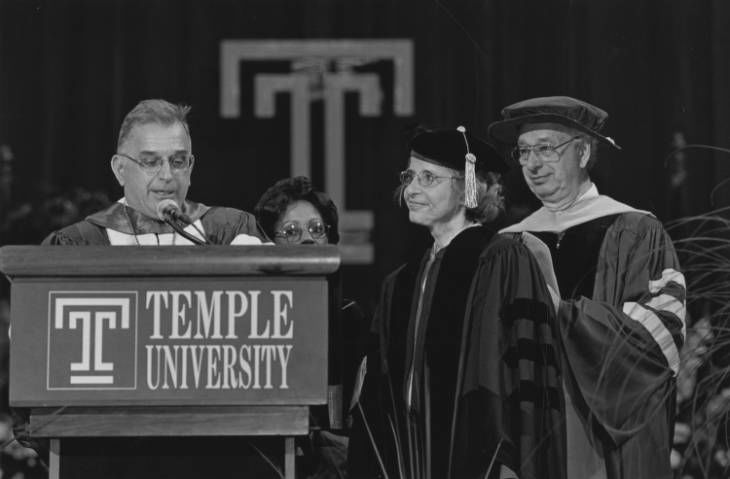
Hon. Phyllis Beck receiving an honorary degree at a Temple commencement
Hon. Phyllis Beck receiving an honorary degree at a Temple commencement
Lucille P. Blondin—BS ʼ20 (Bus)
Executive administrator emeritus of Berean Institute, Philadelphia; honored for her leadership in the black community and especially in black education; recognized by the National Council of Negro Women, the Philadelphia Cotillion Society and the Philadelphia Tribune charities
Dr. Elaine Brown—EdM ʼ45 (Ed)
Founder and director of the Singing City Choir, Philadelphia; recipient of the French Government’s “Prix d’Excellence” for conducting; named a Distinguished Daughter of Pennsylvania; honored with Human Relations and Brotherhood Awards and by the National Conference of Christians and Jews; recipient of 1969 Gimbel Award
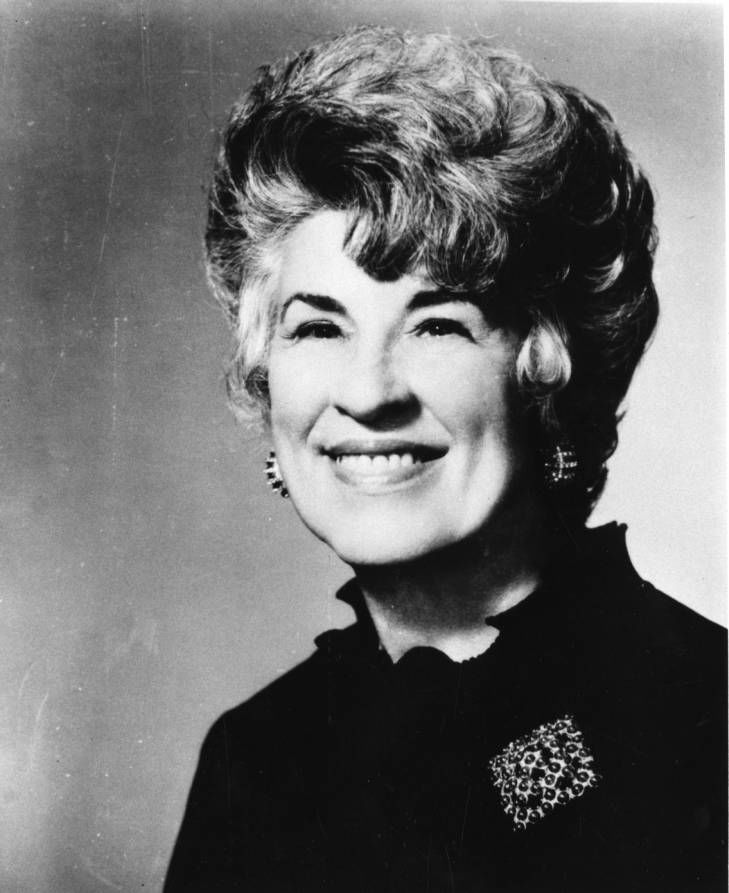
Dr. Elaine Brown
Dr. Elaine Brown
Barbara Chase-Riboud—BFA ʼ56 (Tyler)
Sculptor of international reputation; her unique metal and textile works featured at one woman shows in the United States, France and Germany; published a novel in 1979 entitled Sally Hemmings which deals with the long-standing debate as to whether Thomas Jefferson had a slave mistress; resides in Paris
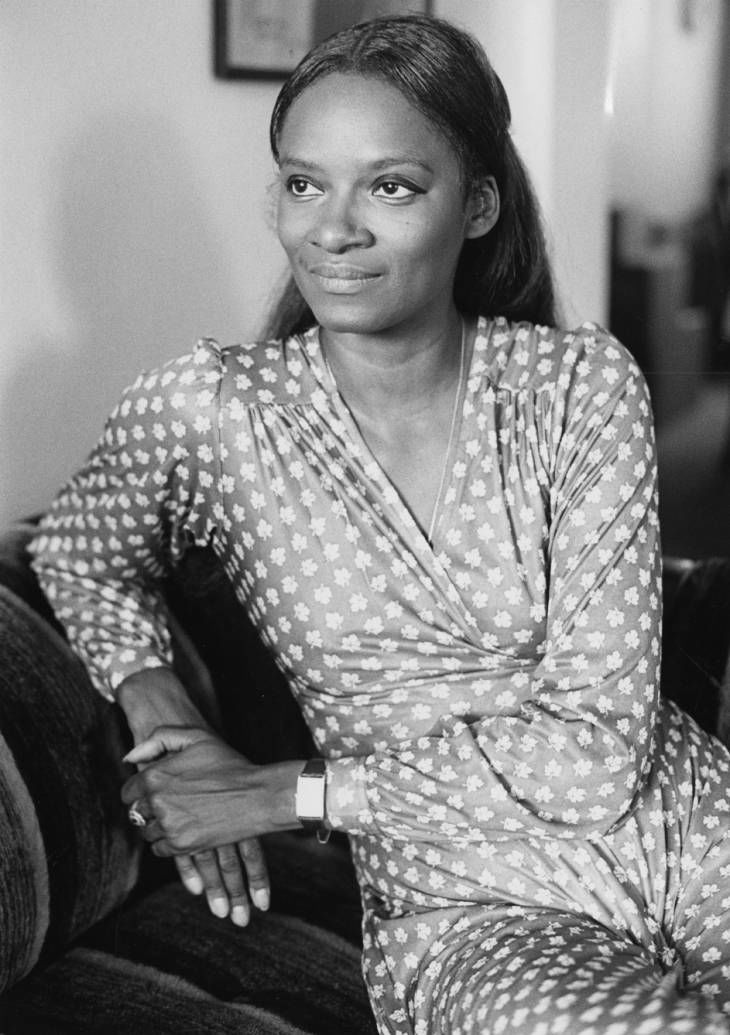
Barbara Chase-Riboud
Barbara Chase-Riboud
Beatrice K. Chernock—BS ʼ52, EdM ʼ53 (Ed)
Former three-term Philadelphia councilwoman-at-large; former leader of the council’s minority party; former school principal; received 1969 Freedom Foundation’s American Educator Medal
Katherine E. Ciesinksi—BA ʼ72 (Music), MA ʼ73 (Ed)
Mezzo-soprano, Metropolitan Opera Company; 1976 Geneva International Competition, first prize; placed second in Metropolitan Opera national Auditions, 1974; featured artist at Temple Centennial College of Music Concert
Katherine E. Ciesinksi performs with Jessye Norman
Hon. Augusta A. Clark—JD ʼ76 (Law)
Librarian; lawyer, Philadelphia city councilwoman; formerly with the Philadelphia Free Library; former affirmative action requirements manager, General Electric Company; former director of Consumer Services, Philadelphia Model Cities Program; chairs City Council Committee on Education
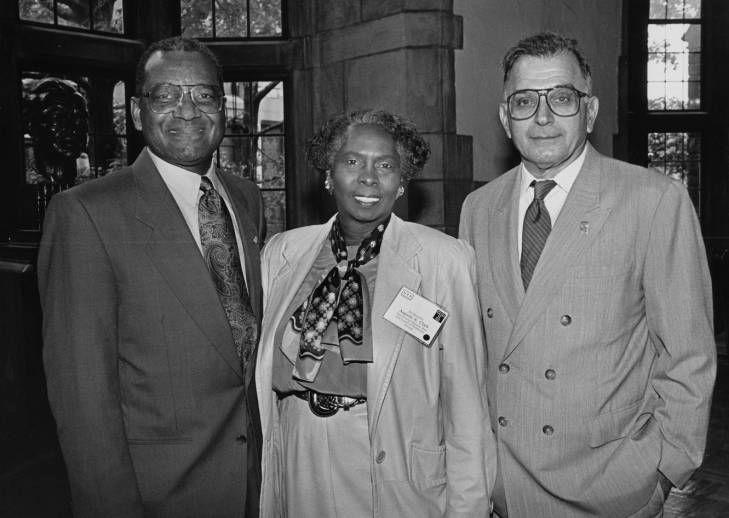
Hon. Augusta A. Clark (center)
Hon. Augusta A. Clark (center)
Dr. Constance Clayton—BS ʼ55, EdM ʼ69 (Ed)
Superintendent of Schools, City of Philadelphia; former associate superintendent for early childhood education; member, board of directors, Model Cities Program; secretary, NAACP, Philadelphia Branch
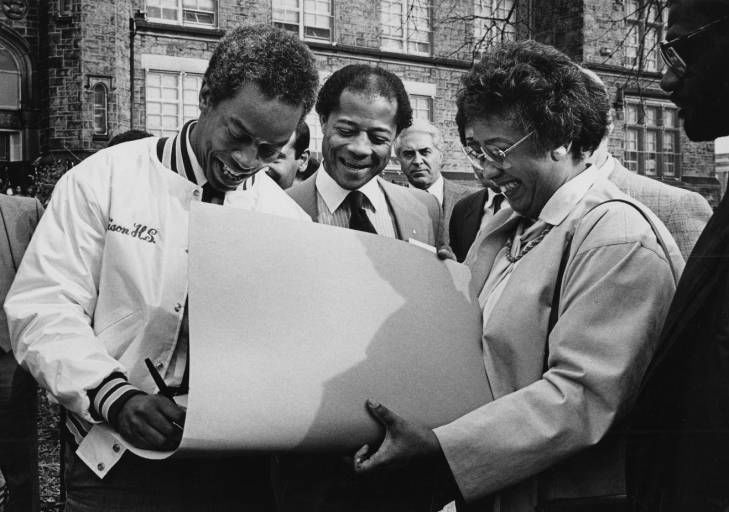
Dr. Constance Clayton (right), with astronaut Guion S. Bluford and Thomas Anderson, Jr.
Dr. Constance Clayton (right), with astronaut Guion S. Bluford and Thomas Anderson, Jr.
Rose DeWolf—BS ʼ56 (Ed)
Columnist; author of Bonds of Acrimony; The Best Defense; How To Raise Your Man; former moderator WCAU-TV, “A.M.”
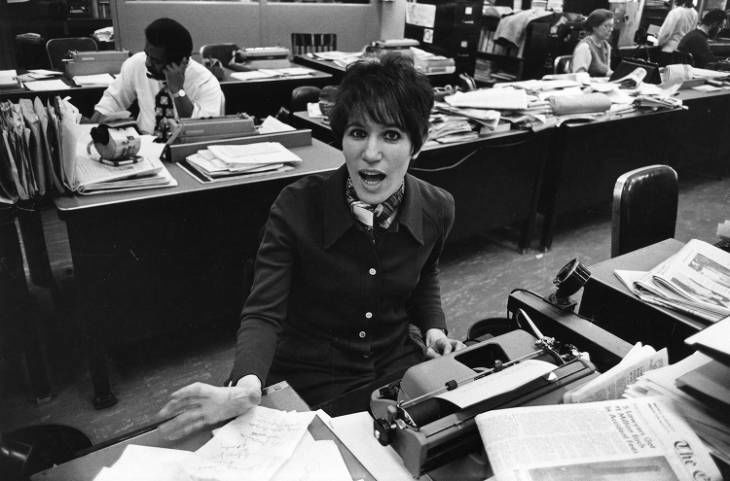
Rose DeWolf at her desk
Rose DeWolf at her desk
Lynn Martin Haskin—BS ʼ69, MS ʼ72 , PhD ʼ81 (SCAT)
Past president of Women in Communications, Inc., the national organization; member of the First Amendment Coalition and a member of Sigma Delta Chi, the Philadelphia Chapter of professional journalists; acting director of academic affairs, Pennsylvania State University
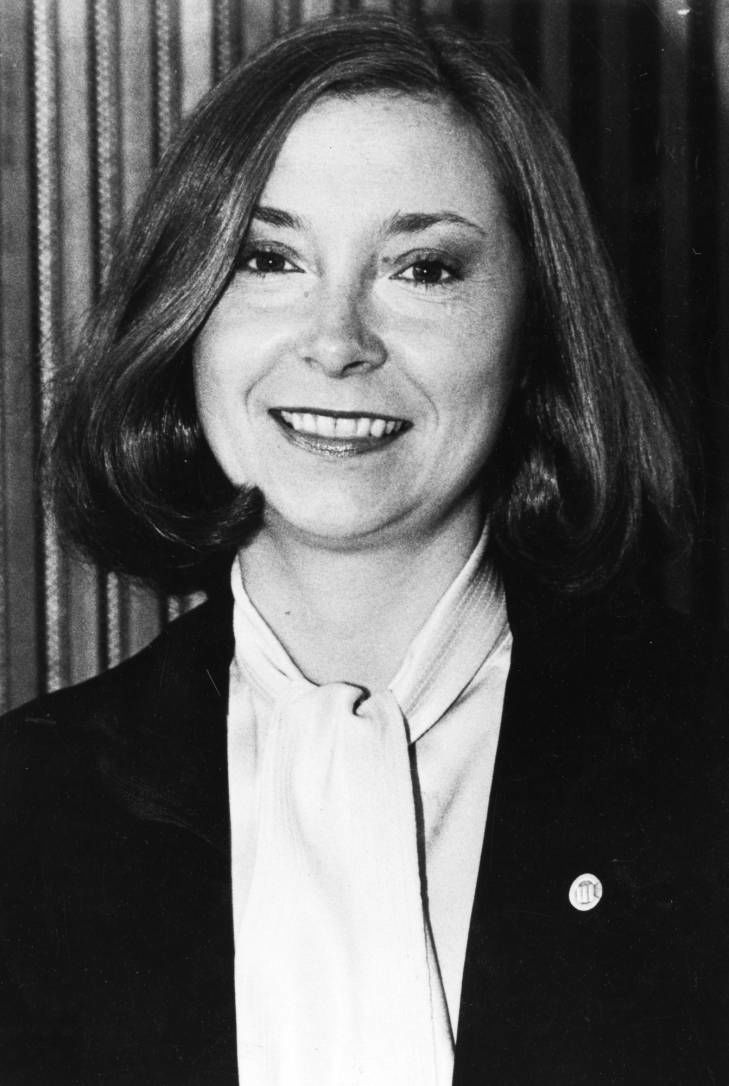
Lynn Martin Haskin
Lynn Martin Haskin
Gwendolyn Killebrew—BMusEd ʼ63 (Music)
Internationally acclaimed mezzo-soprano; won first prize at the International Singing Contest in Belgium and at the Montreal International Music Competition; performed with the New York Philharmonic, Seattle Symphony, Dallas Symphony, Pittsburgh Symphony, Los Angeles Philharmonic and the Milwaukee Symphony
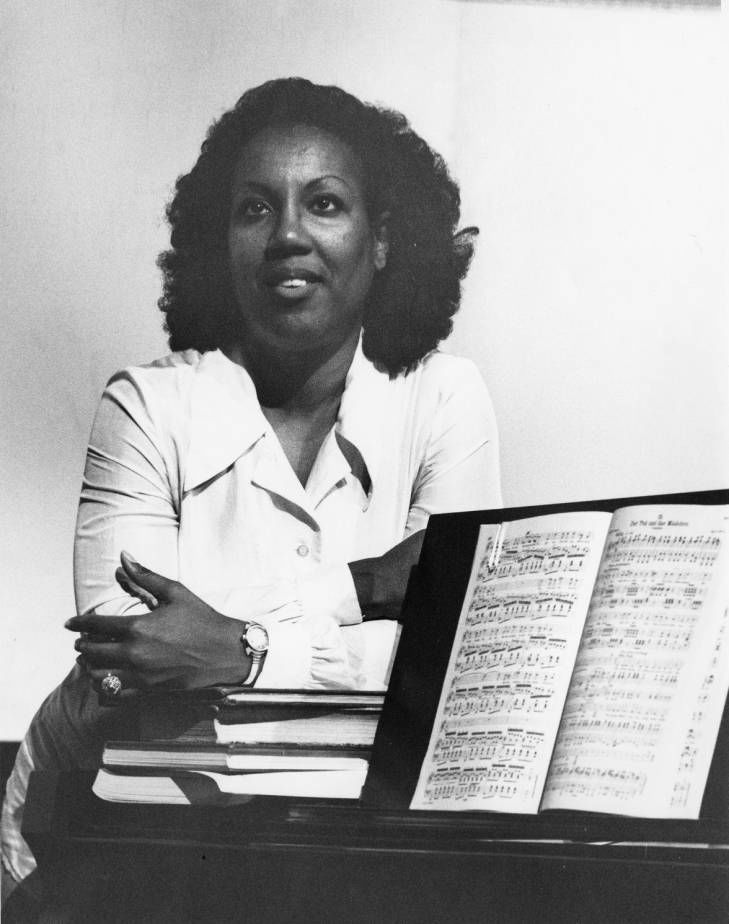
Gwendolyn Killebrew
Gwendolyn Killebrew
Esther Klein—BS ʼ29 (Bus)
Journalist, author and philanthropist in Philadelphia; publisher of Jewish Times; in 1979 was honored with the prestigious Gimbel Award and the same year named a Distinguished Daughter of Pennsylvania; author of A Guidebook to Fairmount Park; facilities named in her honor—Klein Recital Hall, College of Music, Temple University; Esther Klein Independent Apartment for Independent Living at Inglis House; Klein Dining Room at International House and Klein Hall at Harcum Junior College
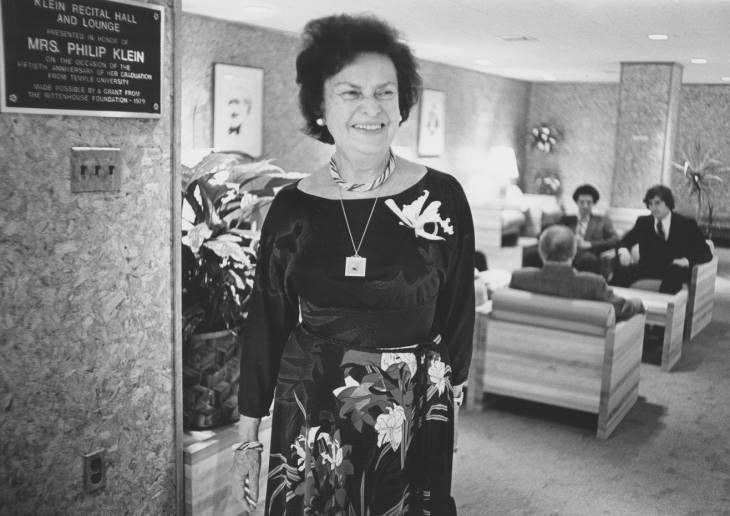
Esther Klein
Esther Klein
Brig. Gen. Chris C. Mann—BFA ʼ49 (Tyler), Bs in Ed ʼ50 (Ed)
Retired; third woman promoted to General in the United States Air Force; was the first woman to attend the National War College in Washington, D.C.; received numerous awards including the Legion of Merit, Meritorious Service Medal with Oakleaf Cluster, Army Commendation Medal and the Air Force Outstanding Unit Award
Anne Noto Rudin—BS in Ed ʼ45 (Ed), RN ʼ46 (Nu)
First woman to be elected mayor of Sacramento, California in November, 1983; received outstanding Women in Government Award from U.S. Jaycee Women, 1984 in Washington, D.C.
Hon. Sheila Pokras—BS ʼ57 (Ed)
In October 1980 named first woman superior court judge in California; previously served as the first woman in the Long Beach Municipal Court and as presiding judge in that court as well.
Rabbi Sandra Sasso—BA ʼ69, MA ʼ72 (AS)
Second woman to be ordained a rabbi in the country; shares congregation with her husband, Rabbi Dennis Sasso
Claire Coleman Schweiker—BA ʼ53 (AS)
Wife of Richard Schweiker, former United States Senator and secretary of Health and Human Services; former star of a local children’s TV program, “Romper Room”
Debra F. Sledge—BFA ʼ78 (Tyler)
and
Joan E. Sledge—BA ʼ78 (SCAT)
Older members of Sister Sledge, popular singing and recording group; hit recordings include “Circle of Love,” “Together” and “We Are Family”
Hon. Elinor Z. Taylor—EdM ʼ58 (HPERD)
Fifth-term state representative; member of the important Education Committee’ director of the Pennsylvania Higher Education Assistance agency; recipient of the General Alumni Association Order of the Owl Award